-
 Bitcoin
Bitcoin $82,509.8850
-2.52% -
 Ethereum
Ethereum $1,800.3816
-3.46% -
 Tether USDt
Tether USDt $0.9996
-0.02% -
 XRP
XRP $2.0537
-1.80% -
 BNB
BNB $589.5226
-1.44% -
 USDC
USDC $1.0000
0.02% -
 Solana
Solana $116.3439
-6.85% -
 Dogecoin
Dogecoin $0.1595
-5.58% -
 Cardano
Cardano $0.6479
-2.79% -
 TRON
TRON $0.2366
-0.33% -
 Toncoin
Toncoin $3.5766
-9.59% -
 UNUS SED LEO
UNUS SED LEO $9.3922
-0.34% -
 Chainlink
Chainlink $12.7758
-5.57% -
 Stellar
Stellar $0.2586
-2.92% -
 Avalanche
Avalanche $18.1038
-3.99% -
 Sui
Sui $2.2274
-5.69% -
 Shiba Inu
Shiba Inu $0.0...01219
-1.98% -
 Hedera
Hedera $0.1627
-3.05% -
 Polkadot
Polkadot $4.0427
-1.01% -
 Litecoin
Litecoin $82.8658
-2.85% -
 MANTRA
MANTRA $6.3993
1.10% -
 Bitcoin Cash
Bitcoin Cash $298.9153
-0.95% -
 Bitget Token
Bitget Token $4.4795
-2.24% -
 Dai
Dai $0.9999
0.01% -
 Ethena USDe
Ethena USDe $0.9994
-0.04% -
 Hyperliquid
Hyperliquid $11.7782
-8.21% -
 Monero
Monero $212.0245
-3.58% -
 Pi
Pi $0.5720
-14.14% -
 Uniswap
Uniswap $5.8118
-4.56% -
 Aptos
Aptos $5.0504
-4.12%
What is the investor structure of the NFT market?
The NFT market's investor structure includes retail investors, institutions, collectors, speculators, artists, platforms, VCs, gamers, influencers, and crypto enthusiasts, each with unique roles and strategies.
Apr 03, 2025 at 10:35 am
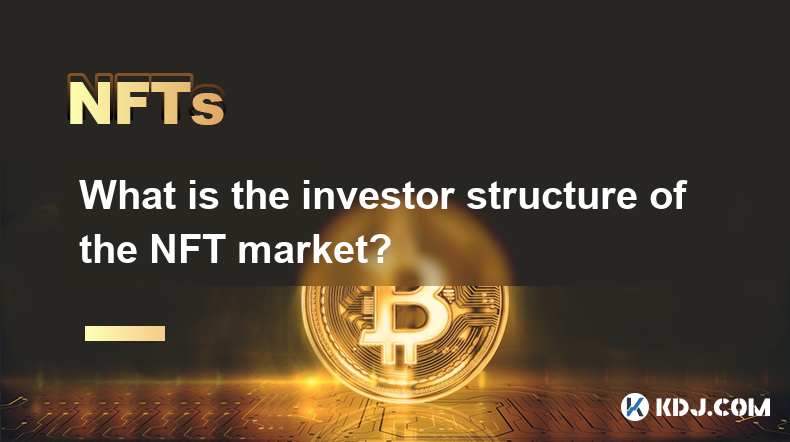
The investor structure of the NFT market is a complex and evolving landscape, comprising various types of participants with distinct motivations and strategies. Understanding this structure is crucial for anyone looking to engage with NFTs, whether as a creator, investor, or collector. In this article, we will explore the different categories of investors in the NFT market, their roles, and how they contribute to the ecosystem's dynamics.
Retail Investors
Retail investors form the backbone of the NFT market. These are individual buyers who often enter the market out of curiosity, interest in digital art, or the desire to be part of a burgeoning trend. Retail investors typically have smaller budgets compared to institutional investors and may engage in NFT trading for both short-term gains and long-term investment.
Retail investors often rely on platforms like OpenSea, Rarible, and Foundation to buy and sell NFTs. They are attracted to the potential for high returns, as seen in cases where certain NFTs have sold for millions of dollars. However, retail investors also face significant risks, including the volatility of NFT prices and the possibility of scams. To mitigate these risks, many retail investors conduct thorough research, follow market trends, and sometimes join NFT communities to gain insights and share experiences.
Institutional Investors
Institutional investors bring a different dimension to the NFT market. These include hedge funds, venture capital firms, and other large financial entities that have the capital and resources to invest heavily in NFTs. Institutional investors often have a more strategic approach, looking to diversify their portfolios and capitalize on the long-term potential of NFTs.
Some institutional investors focus on investing in NFT projects at the development stage, providing funding in exchange for equity or tokens. Others may purchase high-value NFTs directly, hoping to benefit from future appreciation. Institutional involvement can also lend credibility to the NFT market, attracting more retail investors and contributing to market growth. However, their participation can also lead to increased volatility, as large transactions can significantly impact prices.
Collectors
Collectors are a unique subset of NFT investors who are primarily interested in the artistic and cultural value of NFTs. These individuals often have a deep appreciation for digital art and see NFTs as a way to own and support the work of artists. Collectors may focus on specific artists, genres, or themes, building curated collections that reflect their personal tastes and interests.
Collectors often engage with the NFT community through social media, forums, and events, sharing their collections and discussing the art they love. While some collectors may also see their NFTs as investments, their primary motivation is often the joy of collecting and the connection to the art and artists. Collectors play a crucial role in supporting the NFT ecosystem, providing a market for artists and helping to drive the cultural significance of NFTs.
Speculators
Speculators are investors who enter the NFT market with the primary goal of making quick profits. They often focus on buying and selling NFTs based on short-term market trends, looking to capitalize on hype and volatility. Speculators may use various strategies, such as flipping NFTs shortly after purchase or engaging in arbitrage across different platforms.
While speculators can contribute to market liquidity and help drive interest in NFTs, their actions can also lead to increased volatility and price manipulation. Some speculators may engage in practices like "pump and dump" schemes, artificially inflating the price of an NFT before selling it off to unsuspecting buyers. As a result, speculators are often viewed with caution within the NFT community, and their activities can pose risks to other investors.
Artists and Creators
Artists and creators are essential to the NFT market, as they produce the digital assets that drive the ecosystem. Many artists see NFTs as a way to monetize their work directly, bypassing traditional art markets and galleries. By minting their art as NFTs, creators can receive royalties on future sales, providing a new stream of income.
Some artists also invest in other NFTs, either to support fellow creators or to diversify their own portfolios. Creators may participate in NFT marketplaces, collaborate with other artists, and engage with their communities to promote their work. Their involvement in the NFT market not only drives the supply of new NFTs but also contributes to the cultural and artistic value of the ecosystem.
Platforms and Marketplaces
Platforms and marketplaces play a critical role in the NFT market, facilitating the buying, selling, and trading of NFTs. Companies like OpenSea, Rarible, and Nifty Gateway provide the infrastructure for investors to engage with NFTs, offering features like auctions, fixed-price sales, and secondary market trading. These platforms often have their own tokens or fees, creating additional investment opportunities within the NFT ecosystem.
Some platforms also invest in or partner with NFT projects, helping to promote and grow the market. They may offer grants, incubators, or other support to artists and creators, fostering innovation and diversity within the NFT space. Platforms and marketplaces are essential for the liquidity and accessibility of NFTs, enabling investors of all types to participate in the market.
Venture Capitalists
Venture capitalists (VCs) are another important group of investors in the NFT market. These investors typically focus on funding early-stage NFT projects, providing capital and resources to help them grow. VCs often look for projects with strong teams, innovative ideas, and the potential for high returns.
VCs may invest in NFT platforms, marketplaces, or specific projects, taking equity or tokens in exchange for their funding. Their involvement can help accelerate the development of the NFT ecosystem, bringing new projects and technologies to market. However, VCs also face risks, as many NFT projects are still in their early stages and may not succeed. As a result, VCs often conduct extensive due diligence and may spread their investments across multiple projects to mitigate risk.
Gamers and Gamified NFT Investors
Gamers and investors interested in gamified NFTs represent a growing segment of the NFT market. These investors are drawn to NFTs that are integrated into video games, virtual worlds, and other interactive experiences. Gamified NFTs can include in-game assets, characters, or other digital items that players can own, trade, and use within the game.
Gamers and gamified NFT investors often see these assets as both a way to enhance their gaming experience and as potential investments. Some games offer the ability to earn NFTs through gameplay, creating new opportunities for investors to acquire assets without direct purchase. This segment of the NFT market is closely tied to the broader gaming industry and can drive significant interest and investment in NFTs.
Influencers and Celebrities
Influencers and celebrities have also entered the NFT market, both as investors and as creators. These high-profile individuals can bring significant attention and credibility to NFTs, driving interest and investment from their followers. Some influencers and celebrities create their own NFT collections, leveraging their personal brand to attract buyers.
Others invest in existing NFTs, often sharing their purchases and experiences with their audiences. The involvement of influencers and celebrities can help mainstream the concept of NFTs, making them more accessible and appealing to a broader audience. However, their participation can also contribute to market hype and volatility, as their endorsements can drive rapid price increases and speculative buying.
Institutional Collectors
Institutional collectors are another category of investors in the NFT market, representing museums, galleries, and other cultural institutions. These organizations may invest in NFTs to build digital art collections, preserve cultural heritage, and engage with new forms of art. Institutional collectors often have a long-term perspective, focusing on the historical and artistic value of NFTs rather than short-term financial gains.
By investing in NFTs, institutional collectors help legitimize the market and provide a stable demand for high-quality digital art. They may also collaborate with artists and platforms to create new opportunities for NFT creators and collectors. Institutional collectors play a crucial role in bridging the gap between traditional art markets and the digital realm, contributing to the broader acceptance and appreciation of NFTs.
DeFi and Crypto Enthusiasts
DeFi (Decentralized Finance) and crypto enthusiasts are a significant segment of the NFT market, often seeing NFTs as an extension of the broader blockchain and cryptocurrency ecosystem. These investors are typically well-versed in blockchain technology and may be involved in other crypto-related activities, such as trading, staking, or lending.
DeFi and crypto enthusiasts may invest in NFTs as a way to diversify their portfolios and explore new opportunities within the blockchain space. They often have a deep understanding of the technical aspects of NFTs, including smart contracts, token standards, and decentralized platforms. Their involvement can help drive innovation and adoption within the NFT market, as they bring their knowledge and experience from the broader crypto ecosystem.
Common Questions Related to the Investor Structure of the NFT Market
Q: What are the main types of investors in the NFT market?
A: The main types of investors in the NFT market include retail investors, institutional investors, collectors, speculators, artists and creators, platforms and marketplaces, venture capitalists, gamers and gamified NFT investors, influencers and celebrities, institutional collectors, and DeFi and crypto enthusiasts. Each group has different motivations and strategies, contributing to the diverse and dynamic nature of the NFT market.
Q: How do retail investors participate in the NFT market?
A: Retail investors participate in the NFT market by buying and selling NFTs on platforms like OpenSea, Rarible, and Foundation. They often engage in NFT trading for both short-term gains and long-term investment, relying on research, market trends, and community insights to make informed decisions.
Q: What role do institutional investors play in the NFT market?
A: Institutional investors, such as hedge funds and venture capital firms, bring significant capital and strategic investment to the NFT market. They may invest in NFT projects at the development stage or purchase high-value NFTs directly, contributing to market growth and credibility while also potentially increasing volatility.
Q: How do collectors contribute to the NFT ecosystem?
A: Collectors contribute to the NFT ecosystem by supporting artists and building curated collections that reflect their personal tastes and interests. They often engage with the NFT community, sharing their collections and discussing the art they love, which helps drive the cultural significance of NFTs.
Q: What are the risks associated with speculators in the NFT market?
A: Speculators can contribute to market liquidity but also pose risks such as increased volatility and price manipulation. Some may engage in practices like "pump and dump" schemes, artificially inflating prices before selling to unsuspecting buyers, which can harm other investors.
Q: How do artists and creators benefit from the NFT market?
A: Artists and creators benefit from the NFT market by monetizing their work directly and receiving royalties on future sales. They can also invest in other NFTs, collaborate with other artists, and engage with their communities to promote their work, driving the supply and cultural value of NFTs.
Q: What role do platforms and marketplaces play in the NFT market?
A: Platforms and marketplaces like OpenSea, Rarible, and Nifty Gateway facilitate the buying, selling, and trading of NFTs, providing essential infrastructure for investors. They may also invest in or partner with NFT projects, offering grants and support to foster innovation and growth within the ecosystem.
Q: How do venture capitalists contribute to the NFT market?
A: Venture capitalists contribute to the NFT market by funding early-stage projects, providing capital and resources to help them grow. They often look for projects with strong teams and innovative ideas, helping to accelerate the development of the NFT ecosystem.
Q: What attracts gamers and gamified NFT investors to the NFT market?
A: Gamers and gamified NFT investors are attracted to NFTs integrated into video games and virtual worlds, seeing them as a way to enhance their gaming experience and as potential investments. Some games offer the ability to earn NFTs through gameplay, creating new opportunities for investors.
Q: How do influencers and celebrities impact the NFT market?
A: Influencers and celebrities impact the NFT market by bringing attention and credibility, driving interest and investment from their followers. They may create their own NFT collections or invest in existing ones, contributing to market hype and mainstream adoption but also potentially increasing volatility.
Q: What is the role of institutional collectors in the NFT market?
A: Institutional collectors, such as museums and galleries, invest in NFTs to build digital art collections and preserve cultural heritage. They often have a long-term perspective, focusing on the historical and artistic value of NFTs, helping to legitimize the market and bridge traditional and digital art worlds.
Q: How do DeFi and crypto enthusiasts engage with the NFT market?
A: DeFi and crypto enthusiasts engage with the NFT market as an extension of the broader blockchain and cryptocurrency ecosystem. They may invest in NFTs to diversify their portfolios and explore new opportunities, bringing their knowledge and experience from the crypto space to drive innovation and adoption within the NFT market.
Disclaimer:info@kdj.com
The information provided is not trading advice. kdj.com does not assume any responsibility for any investments made based on the information provided in this article. Cryptocurrencies are highly volatile and it is highly recommended that you invest with caution after thorough research!
If you believe that the content used on this website infringes your copyright, please contact us immediately (info@kdj.com) and we will delete it promptly.
- How XRPL Utility Can Support Token Price Growth
- 2025-04-04 05:35:12
- Long-dormant Bitcoin wallets have suddenly sprung to life
- 2025-04-04 05:35:12
- ExoraPad ($EXP), an innovative AI-powered launchpad exclusively developed for the XRP Ledger (XRPL), has reached an impressive milestone
- 2025-04-04 05:30:12
- XRP Price Surge Could Enable Early Retirement for Numerous Investors
- 2025-04-04 05:30:12
- XRP Price Prediction: Will XRP Bounce From This Support Or Continue Its Descent?
- 2025-04-04 05:25:12
- As US Treasury yields hit 6-month lows, Bitcoin (BTC) price may be poised for a breakout
- 2025-04-04 05:25:12
Related knowledge
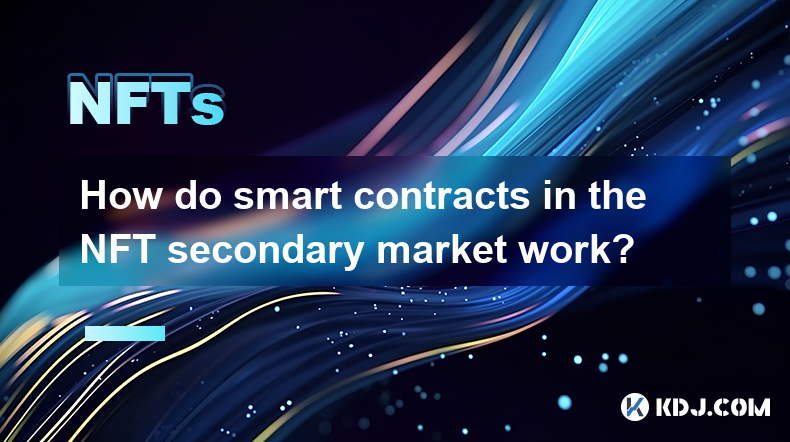
How do smart contracts in the NFT secondary market work?
Apr 03,2025 at 07:14am
Smart contracts play a pivotal role in the NFT secondary market, facilitating seamless transactions and enforcing predefined rules. These self-executing contracts with the terms of the agreement directly written into code are stored on the blockchain. In the context of NFTs, smart contracts automate the buying, selling, and transferring of digital asset...
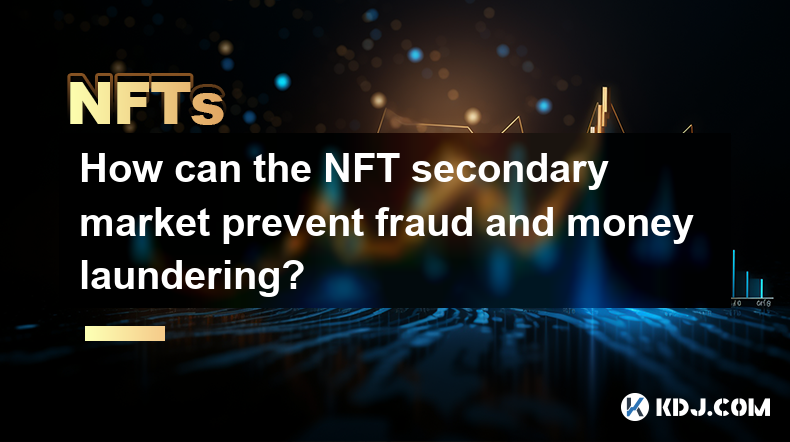
How can the NFT secondary market prevent fraud and money laundering?
Apr 03,2025 at 08:35am
The NFT secondary market has become a thriving hub for digital art and collectibles, but it also faces challenges in preventing fraud and money laundering. To tackle these issues, the market can implement various strategies and technologies to ensure a safer and more transparent trading environment. This article will explore how the NFT secondary market...
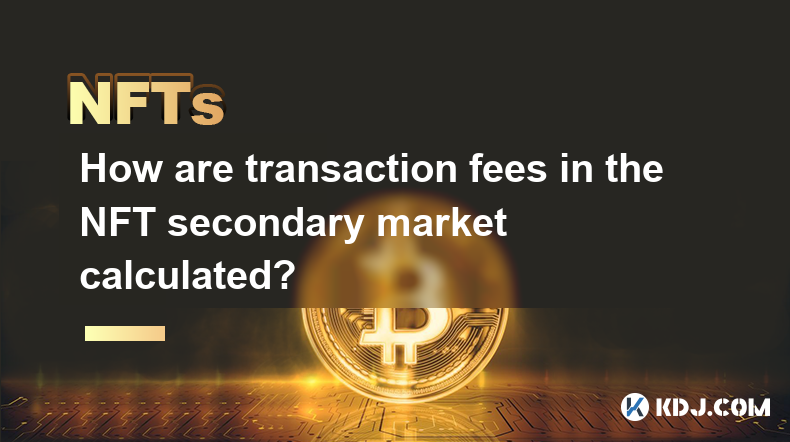
How are transaction fees in the NFT secondary market calculated?
Apr 04,2025 at 05:28am
The calculation of transaction fees in the NFT secondary market is a crucial aspect that both buyers and sellers need to understand. These fees can significantly impact the overall cost of transactions and the profits that sellers can make. In this article, we will delve into the various components that make up these fees, how they are calculated, and w...
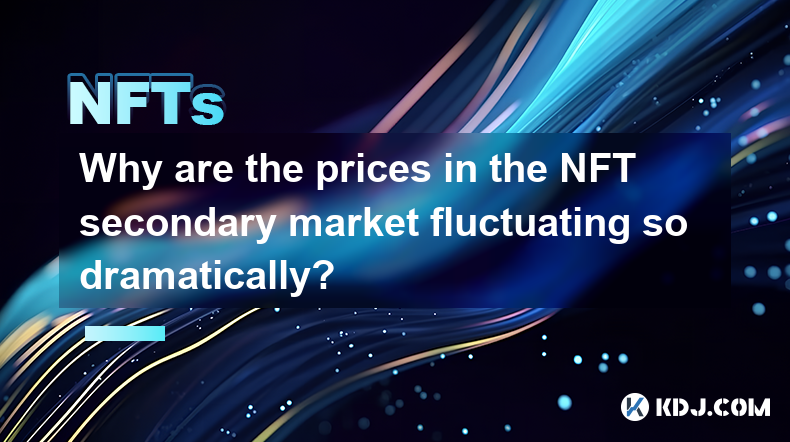
Why are the prices in the NFT secondary market fluctuating so dramatically?
Apr 03,2025 at 10:35pm
The NFT secondary market has been experiencing dramatic price fluctuations, leaving many in the cryptocurrency community puzzled and curious. To understand this phenomenon, it's essential to delve into the factors driving these price movements. From the impact of market sentiment and celebrity endorsements to the role of speculation and the unique natur...
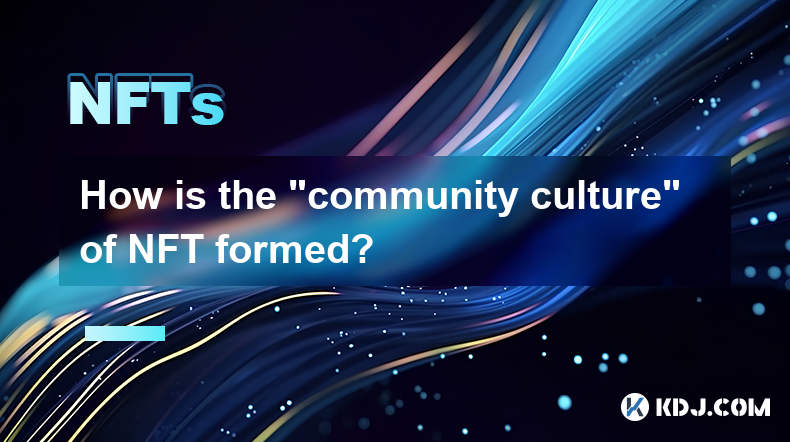
How is the “community culture” of NFT formed?
Apr 03,2025 at 11:07am
The formation of the 'community culture' within the NFT (Non-Fungible Token) space is a fascinating and multi-faceted process. It involves various elements such as shared interests, active engagement, and the creation of a sense of belonging among members. NFT communities often revolve around specific projects or artists, fostering a unique environment ...
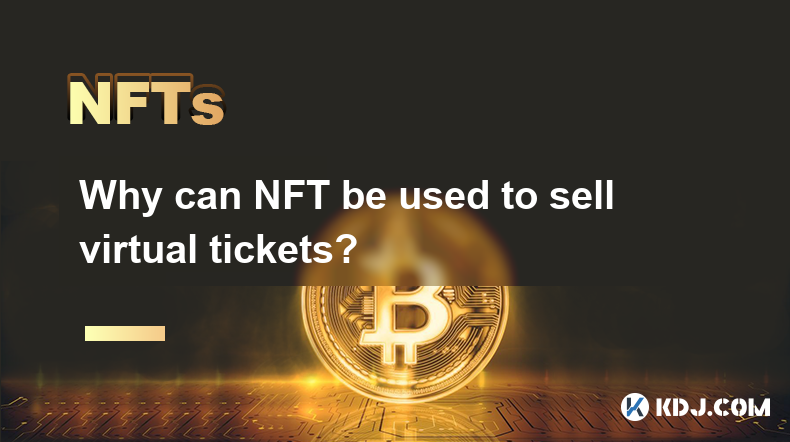
Why can NFT be used to sell virtual tickets?
Apr 03,2025 at 01:35pm
NFTs, or Non-Fungible Tokens, have revolutionized the way we think about digital ownership and value, particularly in the realm of virtual tickets. The primary reason NFTs can be used to sell virtual tickets is their unique nature. Unlike cryptocurrencies such as Bitcoin or Ethereum, which are fungible and can be exchanged on a one-to-one basis, NFTs ar...

How do smart contracts in the NFT secondary market work?
Apr 03,2025 at 07:14am
Smart contracts play a pivotal role in the NFT secondary market, facilitating seamless transactions and enforcing predefined rules. These self-executing contracts with the terms of the agreement directly written into code are stored on the blockchain. In the context of NFTs, smart contracts automate the buying, selling, and transferring of digital asset...

How can the NFT secondary market prevent fraud and money laundering?
Apr 03,2025 at 08:35am
The NFT secondary market has become a thriving hub for digital art and collectibles, but it also faces challenges in preventing fraud and money laundering. To tackle these issues, the market can implement various strategies and technologies to ensure a safer and more transparent trading environment. This article will explore how the NFT secondary market...

How are transaction fees in the NFT secondary market calculated?
Apr 04,2025 at 05:28am
The calculation of transaction fees in the NFT secondary market is a crucial aspect that both buyers and sellers need to understand. These fees can significantly impact the overall cost of transactions and the profits that sellers can make. In this article, we will delve into the various components that make up these fees, how they are calculated, and w...

Why are the prices in the NFT secondary market fluctuating so dramatically?
Apr 03,2025 at 10:35pm
The NFT secondary market has been experiencing dramatic price fluctuations, leaving many in the cryptocurrency community puzzled and curious. To understand this phenomenon, it's essential to delve into the factors driving these price movements. From the impact of market sentiment and celebrity endorsements to the role of speculation and the unique natur...

How is the “community culture” of NFT formed?
Apr 03,2025 at 11:07am
The formation of the 'community culture' within the NFT (Non-Fungible Token) space is a fascinating and multi-faceted process. It involves various elements such as shared interests, active engagement, and the creation of a sense of belonging among members. NFT communities often revolve around specific projects or artists, fostering a unique environment ...

Why can NFT be used to sell virtual tickets?
Apr 03,2025 at 01:35pm
NFTs, or Non-Fungible Tokens, have revolutionized the way we think about digital ownership and value, particularly in the realm of virtual tickets. The primary reason NFTs can be used to sell virtual tickets is their unique nature. Unlike cryptocurrencies such as Bitcoin or Ethereum, which are fungible and can be exchanged on a one-to-one basis, NFTs ar...
See all articles






















































































